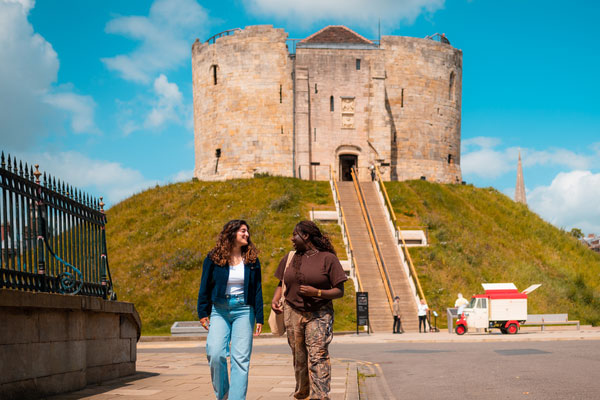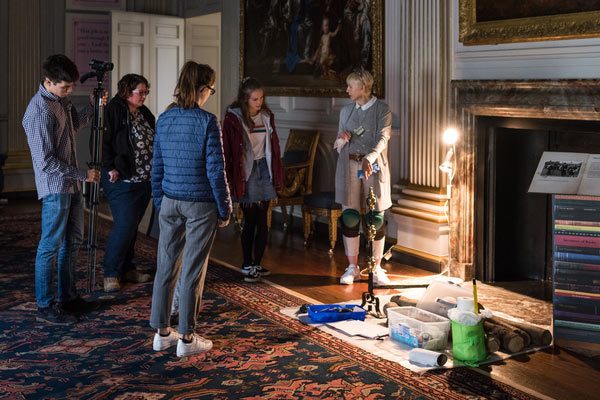.jpg)
Explore the changing ways we interpret the past and apply them in the heritage sector.
Year of entry: 2024 (September)
Join us online or in person to find out more about postgraduate study at York.
Upcoming eventsHistory is all around us. The way we understand and interpret the past impacts our identities, shapes the present and informs the future. Our interdisciplinary degree in Public History is an opportunity to explore the role of history in society, gaining hands-on experience in the heritage sector alongside cutting edge academic training.
You'll study global perspectives on the relationship between the past and the public and evaluate their impact on modern day societies. You'll explore the role of museums and other heritage institutions, and consider the public history work of curators, archivists, and historians. At the same time you'll analyse how engagement with history has evolved with new types of media, from film and TV to social media and virtual reality. You'll also undertake a valuable placement in order to tackle your own public history project, developing important skills in practice.
This MA is offered through History in conjunction with the Institute for the Public Understanding of the Past (IPUP).
 The MA in Public History has reinvigorated my love of history itself. I have been inspired by my course-mates and a wide variety of tutors and practitioners, who have opened my eyes to the breadth of opportunities beyond university. The flexibility of the programme has allowed me to really focus on my passions, and has equipped me with excellent tools to develop them in my future career.Ben, MA Public History student
The MA in Public History has reinvigorated my love of history itself. I have been inspired by my course-mates and a wide variety of tutors and practitioners, who have opened my eyes to the breadth of opportunities beyond university. The flexibility of the programme has allowed me to really focus on my passions, and has equipped me with excellent tools to develop them in my future career.Ben, MA Public History student
The beautiful, historic city of York has a wealth of museums, archives and heritage organisations. These can provide opportunities for relevant part-time work.
Develop professional connections and gain practical experience through an exciting work placement as part of your course.
Our MA offers an excellent grounding in the principles and practices of public history, combined with the flexibility to explore the subjects that you are most passionate about. Alongside a core module and your placement, you'll have the choice of a range of option modules in History, from the early medieval to the contemporary world.
You'll decide your own topics for all assessments and your dissertation, with the support of your supervisors, discovering and refining your own research interests. Through critical reflection, you will grow into a public historian in your own right.
You will also study two option modules. In previous years, options have covered topics such as:
The Department of Archaeology also offer a variety option modules which may be available to Public History students, subject to availability. Examples of recent modules offered include:
The options available to you will be confirmed after you begin your course. For further information please get in touch.
Our modules may change to reflect the latest academic thinking and expertise of our staff.
You will write a dissertation of between 14,000 - 16,000 words on a topic of your choice. Using source materials and analysis techniques, you will draft up the findings into an independently researched dissertation.
You will receive support, advice and guidance from your dissertation adviser throughout your project. The range of expertise of our staff and of our source materials means we can provide you with guidance on a wide range of topics.
You will have five one-to-one meetings with your dissertation adviser across Semester 2 and the summer period (June/July). In these meetings, you will discuss the feasibility of your project and receive feedback on two draft chapters of your dissertation.
The placement is a unique opportunity to get hands-on experience working in the field and will help put what you've learned into practice. It takes place during Semester 2, when you will work closely with an external organisation to delivery a public history project. Host organisations include museums, archives, production companies, historic houses, historical consultants and community organisations. Projects you might work on range from exhibitions to education packs, podcasts to walking trails, social media campaigns to funding bids. This experience will help you to think critically and evaluate your public history practice, while gaining highly valuable experience and skills for your future.
Placements are organised on your behalf and change from year to year. Recent placement hosts include:
Before starting a placement that forms part of your course, you are likely to be asked by the placement provider to sign a confidentiality agreement. This is to ensure that you do not disclose any information that is confidential to the placement provider.
Every course at York is built on a distinctive set of learning outcomes. These will give you a clear understanding of what you will be able to accomplish at the end of the course and help you explain what you can offer employers. Our academics identify the knowledge, skills, and experiences you'll need upon graduation and then design the course to get you there.
| Study mode | UK (home) | International and EU |
|---|---|---|
| Full-time (1 year) | £10,590 | £23,900 |
| Part-time (2 years) This is the year 1 fee. Fees for future years are subject to confirmation. |
£5,295 | £11,950 |
Students on a Student Visa are not currently permitted to study part-time at York.
For courses which are longer than one year, the tuition fees quoted are for the first year of study.
UK (home) or international fees? The level of fee that you will be asked to pay depends on whether you're classed as a UK (home) or international student. Check your fee status.
Find out more information about tuition fees and how to pay them.
There is no obligation to purchase books or other texts - all core texts and resources will be available in our library or online.
Discover your funding options to help with tuition fees and living costs.
We'll confirm more funding opportunities for students joining us in 2024/25 throughout the year.
If you've successfully completed an undergraduate degree at York you could be eligible for a 10% Masters fee discount.
You can use our living costs guide to help plan your budget. It covers additional costs that are not included in your tuition fee such as expenses for accommodation and study materials.
Gain a well-rounded understanding of the subject through a wide range of option modules.
and in the world top 50 for History, in the QS World University Rankings by Subject, 2023.
You’ll work with world‐leading academics who’ll challenge you to think independently and excel in all that you do. Our approach to teaching will provide you with the knowledge, opportunities, and support you need to grow and succeed in a global workplace.
Most of your modules will consist of weekly two-hour seminars. The Research Training module will be taught through three-hour workshops. You will normally work in small groups of fewer than 20 students.
We are home to the Borthwick Institute for Archives, a major archive repository in Britain. It holds the records of the Archbishopric of York from the early thirteenth century onwards, and specialises in the study of ecclesiastic institutions.
There are several other important archives housed at York, including the JB Morrell Library and the Raymond Burton Library for Humanities Research. These contain collections covering subjects such as the British Civil Wars, French Revolution and Modern Asian history. Find out more about our libraries.
You will be based in the Department of History in Vanbrugh College on Campus West. Most of your teaching will take place in or close to Vanbrugh College.
You will also get the opportunity to visit and be taught at local museums and heritage sites close to the city.
Our beautiful green campus offers a student-friendly setting in which to live and study, within easy reach of the action in the city centre. It's easy to get around campus - everything is within walking or pedalling distance, or you can always use the fast and frequent bus service.
You will be primarily assessed by essays and your dissertation. You will have the chance to submit assignments for formative assessment, enabling you to get and use feedback before the final summative assessment.


While completing your MA, you will gain essential skills in research, presentation and analysis. These skills are invaluable for progressing to a PhD and for a diverse range of careers, including within the heritage sector.
Please also see profiles of what some of our recent graduates are up to now on this page.
| Typical offer | |
|---|---|
| Undergraduate degree | 2:1 or equivalent in History or a related discipline. Applications are also welcomed from candidates with a 2:2 or equivalent and relevant work experience |
| Other qualifications and experience | We would consider a 2:2 but our decision would depend on the whole application including the quality of the written work submitted. |
| Other international qualifications | Equivalent qualifications from your country |
You will need to submit examples of written work with your application. Please see our guidance on submitting written work.
If English isn't your first language you may need to provide evidence of your English language ability. We accept the following qualifications:
| Minimum requirement | |
|---|---|
| IELTS (Academic and Indicator) | 7.0, minimum 6.5 in each component |
| Cambridge CEFR | C1 Advanced: 185, with 176 in each component |
| Oxford ELLT | 8, minimum 7 in each component |
| Duolingo | 130, minimum 120 in all other components |
| LanguageCert SELT | C1 with 33/50 in each component |
| LanguageCert Academic | 75 with a minimum of 70 in each component |
| KITE | 495-526, with 459-494 in all other components |
| Skills for English | C1: Pass overall, with Pass in each component |
| PTE Academic | 67, minimum 61 in each component |
| TOEFL | 96, minimum 23 in each component |
| Trinity ISE III | Distinction in all component |
For more information see our postgraduate English language requirements.
You may be eligible for one of our pre-sessional English language courses. These courses will provide you with the level of English needed to meet the conditions of your offer.
The length of course you need to take depends on your current English language test scores and how much you need to improve to reach our English language requirements.
After you've accepted your offer to study at York, we'll confirm which pre-sessional course you should apply to via You@York.

We offer a range of campus accommodation to suit you and your budget, from economy to premium.

Explore campus and city life and hear what our current students have to say about living here.

Lively, full of culture and beautiful, York is regularly voted one of the best places to live and visit in the UK.

Find out more about York. Chat to staff and students and take the tour, on campus or online.